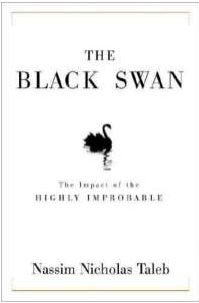
A Black Swan, for the sake of this discussion, has three primary characteristics: it is unpredictable, it carries a massive impact, and after the fact it is possible to assemble a rationale as to how we should have been able to predict it quite easily. These can be positive or negative impacts. A positive example would be the success of Google. Before Google, you would be hard pressed to find someone predicting the widespread success of their business plan. But looking back on it, you can easily find someone that is sorry they missed out on what was such an obvious opportunity.
I would break down this book into three rough sections: the first half, second half, and conclusion.
The first half felt as though he was telling stories about how people did not agree with his theory and why they were wrong--all the while reminding us that anecdotes are not a constructive way to persuade or analyze. Entertaining, but not very useful.
The second half was using the theory to breakdown different aspects of everyday life and analyzing seemingly unimportant decisions.
I think the key point he makes in this section is that the unpredictable characteristic of the Black Swan triad does not have to be the textbook definition of unpredictable but includes events that are highly improbable, assumed to be highly improbable, or events that we have become habituated to and believe as improbable. This can be on a macro scale, such as his discussion of the financial world and how lenders were no longer accounting for risk in lending out money and investors were gobbling up bundled loans. Assumptions that real estate will not go down and bundled loans diversified away risk were, in effect, leading many people to believe that losing money would be impossible. He essentially describes the financial events of 2008 in 2007.
Or on a micro scale, what causes more anxiety, traveling by car or by plane? An average person might drive to and from work, sometimes with additional trips for errands, everyday for years without incident. This exposure without incident gets the traveler habituated to car travel without worry. But each airplane incident is a high profile event covered by all the media, greatly increasing our awareness of the risks of travel. On the upside taking small risks with huge potential gains is smart and a very effective way of making progress. In business, this would be like a venture capital firm finding a bunch of small start up companies. Instead of investing all their money with one of them and hoping it works out, they invest a little of their money in all of them. The one that finds the blockbuster widget makes enough money to more than cover all the other bets.
Taleb's conclusion is where I think most practical people (some would say engineers) might have an issue.
I won't provide any spoilers, but I felt that he was more of a philosopher than a statistician and he showed it in the end. I don't disagree with his thoughts and think his outlook is very healthy. But if you are looking for any kind of checklist to follow or detailed strategy to avoid Black Swans other than being aware that they are out there, you might be disappointed. Overall, I think this was a good read that at the very least will give you a new perspective to view common situations.
An Engineering Perspective:
If you were to try to apply this to something in the engineering world--and I do think that there are many areas where this line of thought can be very useful if not possible to put into an SOP--I think the most direct would be safety. Hopefully, accidents are a highly improbable. But by acknowledging the potential and being prepared, the impact of such events can be minimized. Taking the above example of car travel, if you recognize that there are inherent risks to car travel you can take precautions, like wearing a seat belt, and minimize the effect of an accident. If your workplace included heights, wearing fall protection would minimize the result of a slip or fall.
The Black Swan: The Impact of the Highly Improbable is written by Nassim Nicholas Taleb.
Has anyone else read The Black Swan? What did you think?
Related articles by Zemanta
- Taleb Says 'Every Human' Should Short U.S. Treasuries (Update1) (businessweek.com)
- 'Black Swan' Author Concerned About Hyperinflation (Update1) (businessweek.com)
- January 2010 Reading List (roundintriangles.wordpress.com)




Comments
Robert, Another good read, mentioned in "The Black Swan," is "Ubiquity: Why Catastrophes Happen" by Mark Buchanan. In it, the author explains the power law feature of unstable systems, and how a seemingly small event is often what triggers the catastrophe. Marty Bergstedt
Thanks for the suggestion Marty. I'll look into it.
Really attention-grabbing articles. I loved reading it. Are these genuine pictures or has the artwork been touched up they are truly. Thanks for sharing a nice info.